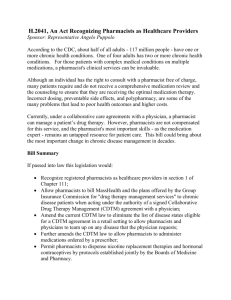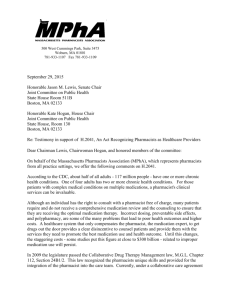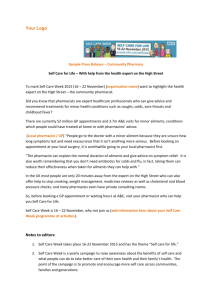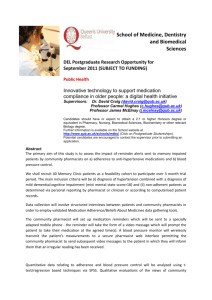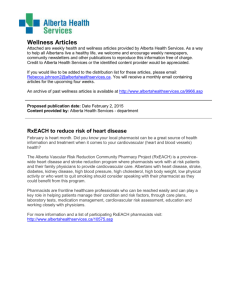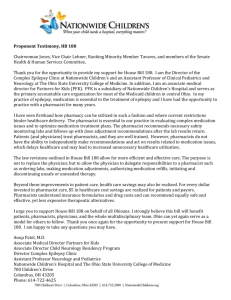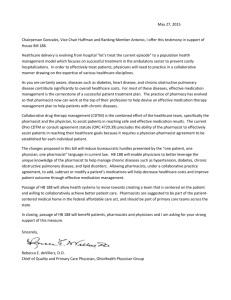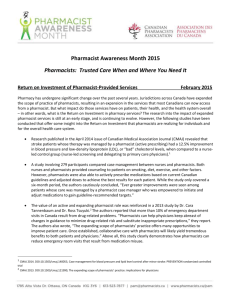Supplementary Prescribing –frequently asked questions
advertisement
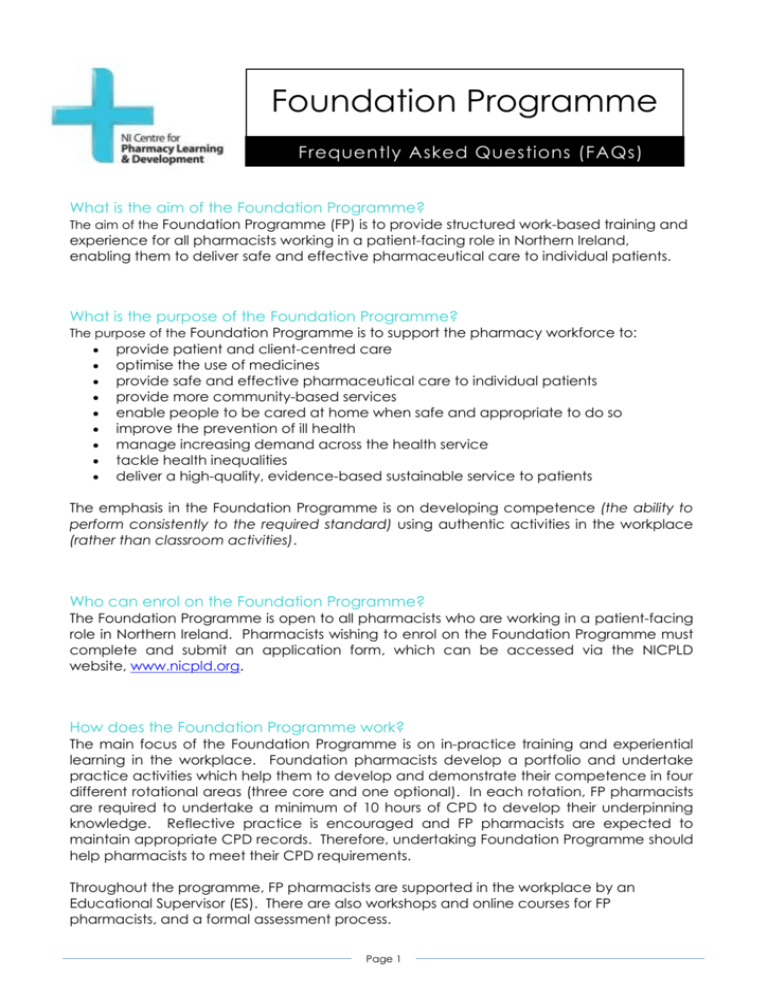
Foundation Programme Frequently Asked Questions (FAQs) What is the aim of the Foundation Programme? The aim of the Foundation Programme (FP) is to provide structured work-based training and experience for all pharmacists working in a patient-facing role in Northern Ireland, enabling them to deliver safe and effective pharmaceutical care to individual patients. What is the purpose of the Foundation Programme? The purpose of the Foundation Programme is to support the pharmacy workforce to: provide patient and client-centred care optimise the use of medicines provide safe and effective pharmaceutical care to individual patients provide more community-based services enable people to be cared at home when safe and appropriate to do so improve the prevention of ill health manage increasing demand across the health service tackle health inequalities deliver a high-quality, evidence-based sustainable service to patients The emphasis in the Foundation Programme is on developing competence (the ability to perform consistently to the required standard) using authentic activities in the workplace (rather than classroom activities). Who can enrol on the Foundation Programme? The Foundation Programme is open to all pharmacists who are working in a patient-facing role in Northern Ireland. Pharmacists wishing to enrol on the Foundation Programme must complete and submit an application form, which can be accessed via the NICPLD website, www.nicpld.org. How does the Foundation Programme work? The main focus of the Foundation Programme is on in-practice training and experiential learning in the workplace. Foundation pharmacists develop a portfolio and undertake practice activities which help them to develop and demonstrate their competence in four different rotational areas (three core and one optional). In each rotation, FP pharmacists are required to undertake a minimum of 10 hours of CPD to develop their underpinning knowledge. Reflective practice is encouraged and FP pharmacists are expected to maintain appropriate CPD records. Therefore, undertaking Foundation Programme should help pharmacists to meet their CPD requirements. Throughout the programme, FP pharmacists are supported in the workplace by an Educational Supervisor (ES). There are also workshops and online courses for FP pharmacists, and a formal assessment process. Page 1 What does the in-practice training entail? The in-practice training provides FP pharmacists with the opportunity to gain knowledge, skills and experience in three core patient-facing areas, plus one additional optional area relevant to their area of practice: Core areas: Dispensary services Medicines management Evidence based practice Optional areas: Technical services (hospital) Public health (community / primary care) For each rotation there is a specified set of competencies which are used to plan, conduct and evaluate the pharmacist’s in-practice training. These competencies have been derived from the pharmacy-specific General Level competency Framework (GLF) (www.codeg.org). There are also rotational practice activities which the pharmacist must complete, which will help them to develop and demonstrate their competence. (NB. FP pharmacists are expected to provide a minimum of 2-3 pieces of supporting evidence for each competence statement). How long does the pharmacist spend in each rotational area? The workplace rotations are intended to be flexible to accommodate individual learning needs and service requirements. It is suggested that FP pharmacists spend between 3 and 6 months in each rotation, and the full Foundation Programme is intended to take two academic years (approximately 20 months) to complete. How the Foundation Programme works in practice will depend on both the workplace establishment and the individual pharmacist. In some workplace establishments, it may be suitable for the pharmacist to rotate through the four discrete areas in a sequential fashion. However, this may not be practical in other situations, and the pharmacist will need to cover the rotational competencies as and when time allows. This is not a problem, as long as the pharmacist has the opportunity to cover all areas and competencies / practice activities. In addition, experienced pharmacists may be able to demonstrate their competence in a shorter time than 20 months, and those working part-time may require longer than this. Page 2 What practice activities do pharmacists undertake? Pharmacists undertake the following practice activities during the Foundation Programme: A. Dispensary services: Final checking accuracy log - 200 items checked accurately Clinical screening accuracy log - 50 items clinically screened accurately Intervention records / medication incidents - a minimum of 20 CPD - a minimum of 10 hours relevant to the rotational area B. Medicines management: EITHER accompanied ward visits (minimum one medical and one surgical) – 5 OR observed medication review / MUR patient consultations - 5 Pharmaceutical care plans – 12 Oral case presentations – 2 Significant intervention records (grade 4-6) - a minimum of 20 CPD - a minimum of 10 hours relevant to the rotational area C. Evidence based practice: EITHER completion of MiCAL/UKMi workbook AND MI queries answered satisfactorily - 20 OR evidence based medication switch project report or reflective record Risk assessment report, or a critical incident reflective record Procurement report or reflective record Audit presentation CPD - a minimum of 10 hours relevant to the rotational area D. Technical services (hospital): Dispensing accuracy log - 200 items dispensed accurately Final checking accuracy log - 200 items checked accurately Clinical screening accuracy log - 50 items clinically screened accurately Intervention records / medication incidents - a minimum of 20 CPD - a minimum of 10 hours relevant to the rotational area E. Public health (community / primary care): Public health patient case report (12-month follow-up) Behavioural change patient case study Practical public health activity report or reflective record Staff training activity CPD - a minimum of 10 hours relevant to the rotational area Further information on the Foundation Programme practice activities, including downloadable forms, can be accessed via the NICPLD website, www.nicpld.org. Page 3 What workshops will there be for FP pharmacists? FP pharmacists are encouraged to attend Northern Ireland Centre for Pharmacy Learning & Development (NICPLD) FP workshops relevant to their area of practice. NICPLD FP workshops cover the following subject areas: Programme induction Pharmaceutical care plans Clinical lab tests Haematology Team work and effective communication skills Time management and prioritisation Assessing the evidence base Motivating patients to change Working in general practice The workshops cover important subjects and skills that may not be covered specifically in the workplace. They also provide a networking opportunity for FP pharmacists, and discussion and interaction is encouraged to try to foster peer support. FP pharmacists can access these workshops via the NICPLD website, www.nicpld.org. What online courses will there be for FP pharmacists? The following NICPLD online courses provide additional underpinning knowledge to support the Foundation Programme: Antimicrobials and Infection Management Aseptic Dispensing Controlled Drugs – Striking a Balance Improving Medicines Safety Medicines Use Review Public Health – Emergency Contraception Public Health – Obesity Public Health – Smoking Cessation Repeat Dispensing The Responsible Pharmacist These courses can be accessed via the NICPLD website, www.nicpld.org. What assessments will there be for FP pharmacists? There are two types of assessment used in the Foundation Programme: Formative assessments (to aid the FP pharmacist’s development) Summative assessments (to check that they have met the required standard) At the start of each rotation, the FP pharmacist’s Educational Supervisor (ES) uses the rotational competencies to carry out a formative assessment, to help the FP pharmacist to identify their learning needs and to develop a Personal Development Plan (PDP) for that area. The ES meets regularly with the FP pharmacist during the rotation to monitor their progress. At the end of each rotation, the ES will use the rotational competencies to carry out a summative assessment. For each competency, they will check that the FP pharmacist has met the required standard and has provided a minimum of 2-3 pieces of supporting evidence. Page 4 When the FP pharmacist has successfully completed all four rotations, they will have an external summative assessment. They will be asked to submit their FP portfolio of evidence to NICPLD for verification purposes, and to attend the FP Objective Structured Clinical Examination (OSCE) assessment (organised by NICPLD). The OSCE assessment comprises the following 6 OSCE stations: Final accuracy check Clinical screening of a prescription Taking a medication history from a patient Writing a Pharmaceutical Care Plan (PCP) based on the medication history Evidence based practice scenario Technical services scenario OR public health scenario (depending on area of practice) The FP pharmacist is allowed 15 minutes at each OSCE station (including reading/preparation time). The FP pharmacist must pass each OSCE station independently to pass the FP OSCE assessment; no compensation is allowed between OSCE stations. NICPLD issues a Certificate of Completion to FP pharmacists who successfully complete both parts of the external FP assessment process (FP portfolio and FP OSCE assessment). Who can be an Educational Supervisor (ES) for the Foundation Programme? The Educational Supervisor should be a senior pharmacist with experience in supporting and assessing trainees, including pre-registration trainee pharmacists. What is the role of the ES? The ES will have a supportive role. This involves helping the FP pharmacist to identify and meet their learning and development needs, and advising and encouraging them during their in-practice training. The roles and responsibilities of the ES are summarised in a checklist for Educational Supervisors that has been derived from a Professional Development Framework for Pharmacy Staff involved in Education, Training and Workforce Development (www.nhspedc.nhs.uk). The downloadable checklist and additional information and resources for Educational Supervisors can be accessed via the NICPLD website, www.nicpld.org. The ES will meet regularly with the FP pharmacist, but is unlikely to see them every day. Educational Supervisors may be assisted by local Practice Supervisors who are able to support the FP pharmacist’s training and development and observe their practice on a day-to-day basis. The roles and responsibilities of the FP Practice Supervisor are summarised in a checklist for Practice Supervisors that has been derived from a Professional Development Framework for Pharmacy Staff involved in Education, Training and Workforce Development (www.nhspedc.nhs.uk). The downloadable checklist for FP Practice Supervisors can be accessed via the NICPLD website, www.nicpld.org. 17FP2.1 Page 5
